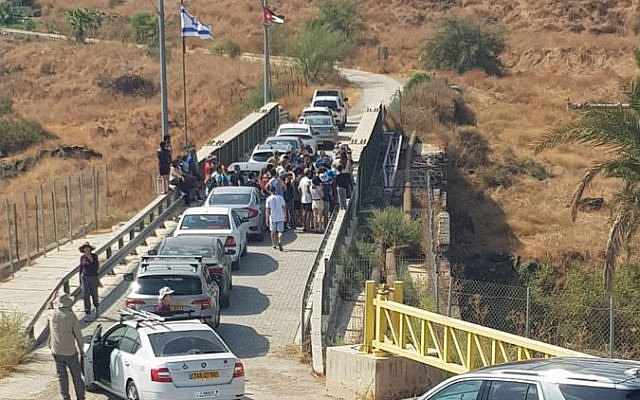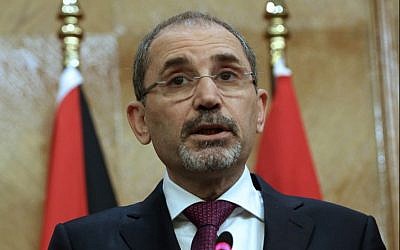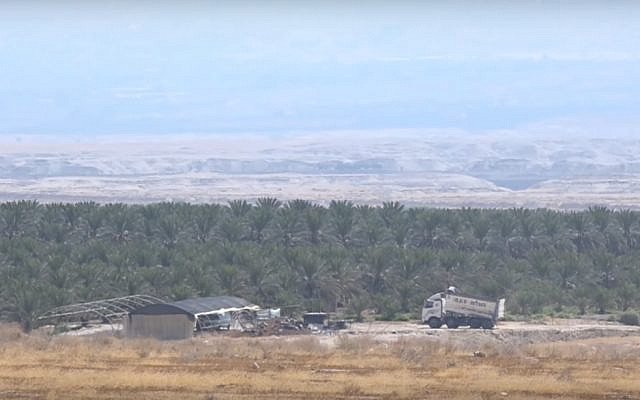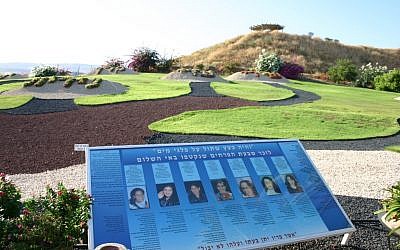Report says Jordanian FM reiterated during visit by national security adviser that Naharayim, Tzofor will return to Amman’s control; local official says access to end Sunday

Jordan has reportedly turned down a request to extend a lease on two enclaves along the border with Israel for six months, instead offering to compensate the Israeli farmers who work the land.
A special clause in the 1994 peace treaty between Israel and Jordan allowed Israel to retain use of Naharayim in the Jordan Valley, along with the Tzofar enclave in the southern Arava desert, for 25 years, with the understanding that the lease would be renewed as a matter of routine.
Last year, amid domestic unrest in Jordan, King Abdullah II announced plans to end the lease. Despite efforts by the Israeli government, negotiations to guarantee continued access to the areas have been unsuccessful.
According to a Channel 13 report Thursday, National Security Adviser Meir Ben-Shabbat met earlier this week in Amman with Jordanian Foreign Minister Ayman Safadi to discuss extending the lease on the border lands.
Citing Jordanian officials, the network reported Safadi suggested that instead of allowing continued access to those areas, Jordan would pay the Israeli farmers for the produce that remains in Naharayim and Tzofar.
Safadi clarified there would be no further agreements between the governments over the lands, but there could be deals between the farmers and Jordanian or Israeli firms, the report said.
The Jordanian foreign minister also reportedly protested to Ben-Shabbat over Israel’s treatment of Jordan.

“Not only you have domestic public opinion, I do too. It is very frustrating to us that you aren’t taking into consideration us or the constraints connected to our public opinion,” Safadi was quoted as saying.
Idan Greenbaum, the head of the Emek HaYarden regional council where Naharayim is located, said earlier Thursday that he was informed by Jordan that beginning Sunday, Israeli farmers would be unable to access the area.
Officials in Israel have expressed concerns that the move signaled a desire on Jordan’s part to effectively downgrade diplomatic ties, and many see it as a reflection of intense domestic pressure from a Jordanian public that still largely views Israel as an enemy.

But Jordan has said it was exercising its legal right in deciding not to renew the agreement and denied the move would affect the decades-old peace treaty, seeking to assuage fears in Jerusalem that ties could be downgraded.
According to Channel 13, Safadi told Ben-Shabbat that while security cooperation between Israel and Jordan remained solid, diplomatic ties between the countries were tense. He suggested allowing Jordan to export goods to the West Bank and the advancement of the long-stalled Red Sea-Dead Sea canal project.
Naharayim, also known as the Isle of Peace, is the site of a deadly March 1997 attack in which a group of schoolgirls from Beit Shemesh were fired upon during an outing to the area. The girls and their unarmed teachers were standing on a hill above an abandoned lake in the enclave when a Jordanian soldier opened fire on them and killed seven of the schoolchildren.

Following the killings, the late king Hussein of Jordan made an unprecedented trip to each of the victims’ homes in Israel to express his personal sorrow and the grief of his nation.
Tensions between Israel and Jordan have mounted in recent years over such issues as the contested status of Jerusalem and its holy sites, stalled peace talks with the Palestinians, and the 2017 shooting of two Jordanian citizens by an Israeli embassy guard in Amman, which ignited a diplomatic crisis.
Ties were again recently frayed over Israel’s detention of two Jordanian nationals for months on suspicion of terror activity. Israel returned the two on Wednesday following an agreement between Jerusalem and Amman to end the diplomatic spat, which saw Jordan recall its ambassador.
Besides Egypt, Jordan is the only Arab country that Israel has a peace agreement with.
As reported by The Times of Israel
